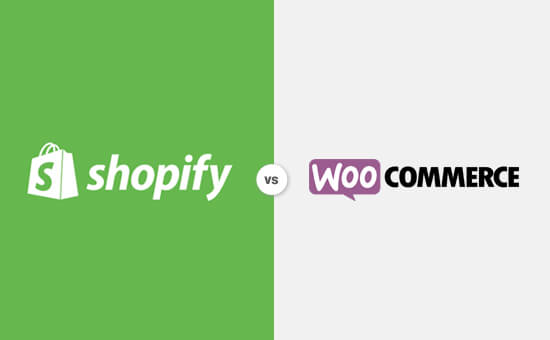Starting a replacement company to select an e-commerce site on which Shopify and WordPress are confused? This text addresses two of the most common e-commerce platforms in the industry with their best business advantages and disadvantages.
Many fresh industries are developing every day and they want to permanently and cozy operate their own e-commerce websites.
So would one want to solve the overall question on those platforms? Should I be paying this fee? Am I in a position to sell these products? I have also tried to answer most of the regular Shopify and WordPress related questions, and much more (WooCommerce).
We first check out the site first and compare highlights from them to answer the above questions. Can it depend on your personal interests, what your market is meant to be and what your needs are?
What is the need for an e-commerce portal?
There are some items that are basic criteria for an e-commerce platform, in addition to non-public needs. These key variables can help you decide the easiest platform for e-commerce.
Simplicity of use
Cost: The expense of repairing an e-commerce store is the most critical factor.
Features the Features
Payment Gateway: A seamless reference to multiple payment gates should be available.
Add-ons: For different third-party platforms, the framework should be able to implement.
Support: Once you have trouble in your shop, customer support.
Summary: Shopify vs WooCommerce
It is vital that we cover the basics and illustrate how these platforms start before contrasting the 2 hottest e-commerce platforms online with our depth.
And what’s Shopify?
Shopify is an all-in-e-commerce platform that allows you to build websites online, accept payment and worry about the technological aspects of one-forum inventory management, web hosting, security, caching, etc.
What’s WooCommerce all about?
WooCommerce is a WordPress-designed open source e-commerce plugin. This helps you to benefit from and use the most powerful content management system (CMS) to run a web store. Thanks to the open-source design, every part of your store can be personalized and you can simply build custom extensions.
Depending to the extent of your needs and abilities, the choice to decide between two platforms depends.
WooCommerce vs Shopify: Which is the Best Platform for E-Commerce?
Both Shopify and WooCommerce are good ways to launch your e-commerce store. Your personal abilities and interests are really involved.
It is incredibly convenient to use Shopify. You don’t have to install anything, and you’re going to start early, payouts are easy to line up, and pricing plans are easy to know.
Shopify’s drawback is that you actually do not have absolute control of anything. With transaction fees, add-ons, and incorporation, the expenditures are also higher. Your upgrade option plans are limited to deciding on, and you won’t handle the salary at the value as soon as you expand.
WooCommerce is open source and gives the website full power. There are minimal to no expenses for WooCommerce to start online stores with these hosting companies.
The downside is that the program simply needs to be maintained. A learning curve comes with it. However, it is already used by many beginners, and they get into the learning process in no time.
If you are trying to find a cost-effective alternative and want to take full ownership of your online shop, WooCommerce is the best platform for you.
If you want to try something that is absolutely unknown, then you have infinite scalability, maybe Shopify is a great platform for you.
We hope this text allows you to align Shopify web design services with professionals and pros from WooCommerce. Also, on the way to selecting the easiest website designer, you can see our website.
If you liked that email, please subscribe to the WordPress video tutorial on our YouTube channel. You’ll find us on Facebook and Twitter as well.
Marketing for customers is business and is therefore very lucrative for the business when done right. The internet is where most customers spend their time, so it is appropriate to concentrate your B2C marketing efforts there. This is mostly public knowledge today, but in this arena, many organizations still struggle. This is also why lots of businesses employ SEO practitioners for assistance.
Small and medium companies have been atrophying 25 percent of their PPC budgets, according to a 2013 Word Stream survey. So a small business that spends $2,000 monthly on Ad Words will find you spending $6,000 annually on under-performing campaigns.
For medium-sized companies that spend around $20,000 monthly on PPC, which equates to $60,000 dollars lost annually, the loss is even greater. This is also loads of money that can be saved by expanding their promotions for B2C marketing. If this is always something that is plaguing your business, then bear in mind the following tips.
Host Competitions for Exclusive
This is a perfect way to get social media exposure and get people involved. This past year, when Lay’s revealed their third annual ‘Do Us a Flavor’ contest, there was an excellent example. For his or her next best-selling flavor, they crowd-sourced consumers’ ideas. Naturally, this attracted people on a global level, so you’re going to say this was a success. Lay’s announced that they got more than 14 million submissions in 2014, up from 3.8 million back in 2013.
Anything for free deal Offer
Freebies are the only thing customers truly enjoy in a contract. This was illustrated during a 2013 study by Harris Interactive, which showed a dramatic rise in repeat purchases and word-of-mouth referrals when free add-ons became available. The findings also found that 90% of customers were somewhat more likely to receive a free gift from a retailer regularly, and 65% were more likely to share their experience after receiving a free gift.
Make SEO a priority with Intent-Driven
It’s not shocking that multinational brands top Google’s gadgets, toys and fashion search results. Also aiming to try to rank highly for those keywords, including holding certain positions, may be insanely costly and exhaustive. Instead, it is recommended that you simply specialize in long-tail keywords important to your product that drive the intent to buy.
It showed that long-tail keywords were 66 percent more lucrative than head keywords in another 2013 study done by Alchemy’s This Thumasathit. This is also an opportunity to establish a sustainable B2C initiative for small and medium enterprises.
Develop a Micro-Influencers Network
To urge an excellent endorsement, you do not need to know the A-liters. If you play your cards right, a few micro-influencers can be everything you’d like. These micro-influencers, together, will provide the brand with ample ads. When Shoes of Prey agreed to allow a 16-year-old beauty blogger to endorse their custom shoe business, an example of this was seen a few years ago. In just a few days, the company’s traffic tripled and profits soared. Micro-influencers can be found almost everywhere – on Twitter, Instagram, Interest, and Facebook. Look for them in areas where you know your audience is hanging out. Otherwise, you’re not going to get the best prospects.
Take an Approach Mobile-First
If your marketing doesn’t take smartphone users into consideration first, then you’re in trouble. 50.3 percent of e-commerce traffic is carried out on mobile devices, according to Shopify. Confirm that your online shopping experience is intended for smartphone users.
Both of these tips will boost your sales, user interaction and online reputation management assistance. Consult with SEO companies and employ one that is trustworthy and provides web design services if you want to help determine a method for your B2C marketing campaign.













